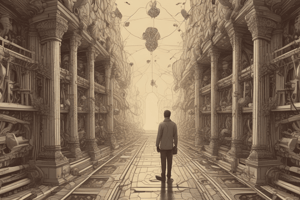Podcast
Questions and Answers
What is the primary role of the ego in psychic functioning?
What is the primary role of the ego in psychic functioning?
- To express primal desires without constraint
- To suppress all unconscious thoughts completely
- To mediate between the id, superego, and external reality (correct)
- To enforce strict moral standards at all times
Which defense mechanism is considered the cornerstone of all defenses?
Which defense mechanism is considered the cornerstone of all defenses?
- Projection
- Repression (correct)
- Rationalization
- Denial
How does Freud's developmental theory primarily lack support?
How does Freud's developmental theory primarily lack support?
- It presents a comprehensive view of psychological development
- It lacks experimental support and is unverifiable (correct)
- It relies on anecdotal evidence and personal accounts
- It is widely accepted across all cultures
What aspect of human behavior has Freud's view of the unconscious been criticized for?
What aspect of human behavior has Freud's view of the unconscious been criticized for?
Which of the following reflects a mature defense mechanism?
Which of the following reflects a mature defense mechanism?
What criticism does Freud's work face regarding its cultural application?
What criticism does Freud's work face regarding its cultural application?
What does the role of defense mechanisms primarily help the ego to manage?
What does the role of defense mechanisms primarily help the ego to manage?
What is a potential characteristic of Freud's views on the unconscious?
What is a potential characteristic of Freud's views on the unconscious?
Flashcards are hidden until you start studying
Study Notes
Dynamic Interaction of Id, Ego, Superego
- Ego mediates conflict between the id's desires and the superego's moral standards.
- The aim of the ego is to ensure harmony between internal drives and external reality.
- Ego strength refers to its ability to balance conflicting demands from the id, superego, and social reality.
Role of Defenses
- Anxiety resulting from internal conflict prompts the ego to employ defense mechanisms.
- Defense mechanisms operate at an unconscious level to protect the self.
- Repression is fundamental, serving as the basis from which other defenses emerge.
Types of Defense Mechanisms
- Infantile defenses:
- Denial: Refusal to acknowledge anger.
- Projection: Ascribing one's anger to others.
- Reaction Formation: Presenting an opposite behavior, like excessive calmness.
- More mature defenses:
- Intellectualization: Analyzing anger through logic to detach emotion.
- Rationalization: Justifying anger as a response to provocation.
Critique of Freud's Developmental Theory
- Freud's theories lack empirical support and cannot be verified through scientific methods.
- While some concepts like the unconscious show influence, their scientific validity is debated.
- The impact of early childhood experiences on adult behavior has considerable research backing.
Cultural Context and Bias
- Freud's theories reflect a cultural bias from their specific socio-historical context.
- His emphasis on sexuality may reflect contemporary societal views rather than universal truths.
- Further research is required to understand psychoanalytical perspectives on issues like class, ethnicity, and gender development in a cultural context.
Limitations of Freud's Views
- Freud's concept of the unconscious as a deterministic force has faced criticism.
- His theories may oversimplify human motivation, reducing achievements to instinctual drives.
- There is a lack of consideration for individual agency or the role of conscious will.
- Despite the criticisms, Freud viewed the psyche as dynamic, constantly adjusting to internal and external changes.
Studying That Suits You
Use AI to generate personalized quizzes and flashcards to suit your learning preferences.




